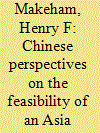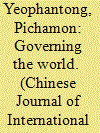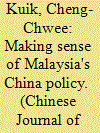|
|
|
Sort Order |
|
|
|
Items / Page
|
|
|
|
|
|
|
| Srl | Item |
| 1 |
ID:
126586


|
|
|
|
|
| Publication |
2013.
|
| Summary/Abstract |
Using the 'achievement index', a country's relative size of gross domestic product divided by its relative size of population, I argue that the high-achieving position of the West, as a structural distortion, has been a principal source of instability in the modern international system. Rather than being just unsatisfied great powers, large high achievers and stagnant low achievers engage in hegemonic and counter-hegemonic warfare, respectively. Both hierarchy and balancing systems are structurally more stable if they are 'natural' and less stable if they are 'unnatural', with being natural defined as an achievement index of 1. The rise of the rest constitutes a long-term trend back to nature, beginning to flatten the heretofore skewed international structure, which lessens one source of modern system-level instability. With a much larger share of world population, China cannot rise to the same relative height as the West that rose with a much smaller share of the population. China's rise is thus unlikely to repeat the past experience of the rising West.
|
|
|
|
|
|
|
|
|
|
|
|
|
|
|
|
| 2 |
ID:
126585


|
|
|
|
|
| Publication |
2013.
|
| Summary/Abstract |
The ongoing worries complicating China's rise are exacerbated by China's perceived double-bind dilemma: China is attacked as a threat to regional stability when it is active in the regional arena and damned as an irresponsible stakeholder when it is not. As an emerging global power China is naturally seeking to secure its ever-increasing interests abroad. Therefore, China's double-bind will intensify as China's foreign policy evolves from 'biding its time and hiding its capacities' to that of an increasingly proactive regional actor. The author argues that, in light of this likely transition in Chinese foreign policy conduct, the time is more pressing than ever before to mitigate anxieties and maximise the chances of China's positive-sum integration within the region. The argument correlates with the proposal by Australian Prime Minister Kevin Rudd in 2008 that the region begin contemplating the realisation of an Asia Pacific community (APc) concept, as a framework to rehabilitate the region's multilateral architectural mélange and implicitly reform the ASEAN Way-driven modus operandi with a more muscular APc Way. Such an outcome may be realised through streamlining the region's institutional alphabet soup and reforming the lacklustre ASEAN Way.
|
|
|
|
|
|
|
|
|
|
|
|
|
|
|
|
| 3 |
ID:
126584


|
|
|
|
|
| Publication |
2013.
|
| Summary/Abstract |
This article examines, from an historical perspective, how the idea of the 'responsibility of power' speaks to Chinese political thought, and assesses its significance to China's evolving engagement with global governance today. It argues that a shift in China's global mentality is now underway: from an aversion to taking the lead to one which sees China reprising its role as a global power and shouldering the responsibilities attached to this status in the management of world affairs. But, contrary to conventional depictions of China's 'responsible power' identity as an externally imposed or purely modern construct, the article illustrates how notions of responsibility and the corollary concept of responsible governance are not new, but have deep roots in Chinese traditions of statecraft and corresponding visions of world order. Taking into account the complex interplay between Chinese conceptions of responsibility and expectations of its global role, change is necessarily situated amidst historical continuity, as linkages are drawn between China's past and its present.
|
|
|
|
|
|
|
|
|
|
|
|
|
|
|
|
| 4 |
ID:
126587


|
|
|
|
|
| Publication |
2013.
|
| Summary/Abstract |
Using Malaysia's China policy as a case study of a smaller state's response to a rising power, this article challenges the mainstream neorealist notion that the growing capability and geographical proximity of a rising power tend to induce fear among its weaker neighbours. By tracing the transformation of Malaysia's China policy, the article's findings indicate that power asymmetry and geographical proximity have no inherent logic of their own; rather, whether and to what extent the two variables will prompt smaller states to become fearful and/or attracted to a rising power is often a function of intervening factors at the domestic level, i.e. the imperative of ruling elite's domestic legitimation. In the case of Malaysia's China policy, it is the ruling Barisan Nasional elite's desire to capitalize on the big power's rise-for the ultimate goal of enhancing and justifying its political authority at home-that has driven the smaller state to adopt a hedging approach characterized by an inclination to prioritize immediate economic and diplomatic benefits over potential security concerns, while simultaneously attempting to keep its strategic options open for as long as the systemic conditions allow.
|
|
|
|
|
|
|
|
|
|
|
|
|
|
|
|
|
|
|
|
|